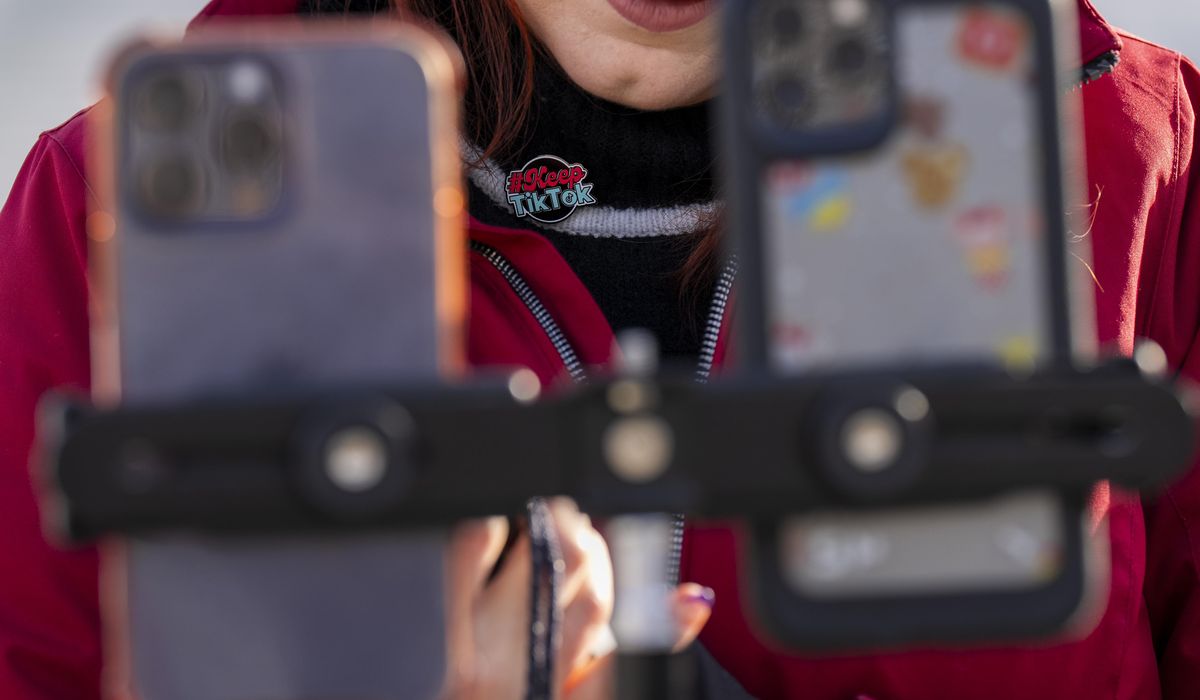


The political battle over TikTok heads for a showdown this weekend when a law effectively banning the popular video-sharing app in the U.S. will go into effect unless the Supreme Court intervenes.
The bipartisan law signed by President Biden in April requires the Chinese owner, ByteDance Ltd., to either sell the app to a U.S. company or to shut down U.S. operations.
The Supreme Court could rule on the case in the next three days. Options include extending the Sunday deadline for enactment of the law or allowing the law to go into effect.
Meanwhile, new details of Chinese Community Party influence in the company that owns TikTok came out in a civil suit in New York by a former TikTok executive, Katie Purvis, who sued both TikTok and China-based owner ByteDance for unlawful termination. Ms. Purvis, a marketing manager, said she was forced to abide by Chinese laws and “the socialist system” directed by communist ideology as a condition of her job.
Meanwhile, Mike Waltz, President-elect Donald Trump’s designated national security adviser, said Wednesday that Mr. Trump is looking at ways to prevent a TikTok shutdown.
“If the Supreme Court comes out with a ruling in favor of the law, President Trump has been very clear: No. 1: TikTok is a great platform that many Americans use and has been great for his campaign and getting his message out. But No. 2: He’s going to protect [users’] data,” Mr. Waltz said on Fox News Channel.
ByteDance did not immediately respond to an email request for comment on whether the app will be sold, but has said in the past that it has no plans to sell. TikTok lawyers argued last week before the Supreme Court that the pending law violates the free speech rights of the more than 175 million Americans who use the app.
Chief Justice John Roberts said during the hearing that ByteDance was subject to Chinese laws to cooperate with intelligence agencies and to ensure the Beijing government has the power to access and control the app’s private data.
“So are we supposed to ignore the fact that the ultimate parent is, in fact, subject to doing intelligence work for the Chinese government?” Mr. Roberts asked.
TikTok lawyer, Noel J. Francisco disputed the charge that ByteDance controls TikTok and said as a U.S. subsidiary the app has free speech rights. Upon the law’s implementation, “we go dark. Essentially, the platform shuts down,” Mr. Francisco said during the hearing.
An earlier Justice Department legal filing in July said TikTok is used by the Chinese to gather sensitive data on American users’ views of religion, abortion and gun control. It also censors online material at the direction of ByteDance. TikTok management has denied the charge.
TikTok is widely, and Mr. Trump himself joined the video-sharing app during the presidential campaign to promote his candidacy among young people, the app’s main users.
More than 18 nations have banned TikTok based on concerns that the Chinese government is getting access to mass amounts of data on users. Critics have also raised concerns about TikTok’s possible role in Chinese influence operations.
The app censors all content on subjects opposed by the Chinese Communist Party, including discussions of Taiwan, human rights violations against Uyghurs in western China and references to the 1989 massacre of pro-democracy protesters in Beijing’s Tiananmen Square.
A think tank report disclosed by The Washington Times in August stated that China’s People’s Liberation Army regards TikTok as among the strategic information warfare tools that support both political influence and military operations.
Ms. Purvis, the former TikTok executive, stated in her filing against the two companies and the China-based companion video app Douyin that she was forced as a condition of employment to sign an agreement promising not to disclose Chinese state secrets or to disrupt ethnic unity in China. The documents were first disclosed by the Daily Caller and confirmed by The Washington Times.
Several companies have expressed an interest in buying TikTok but ByteDance repeatedly rejected the idea of selling and analysts say the Chinese government would be unlikely to approve a sale that transferred TikTok’s valuable algorithms.
Under the new law, TikTok could continue operating but companies providing the app would be prohibited from allowing downloads, updates or maintenance. Internet service providers also will be barred from allowing the use of the app.
“TikTok itself is a fantastic platform,” Mr. Waltz, a former House Republican member, said on Fox. “We’re going to find a way to preserve it but protect people’s data.”
Mr. Waltz said a provision in the law for a 90-day extension before taking effect if significant progress toward divestiture is underway “essentially buys President Trump time to keep TikTok going.”
President Biden has no plans to intervene to prevent the law from going into effect, a White House official told Reuters Wednesday, but the outgoing administration is said to be weighing options to keep the social media platform afloat after Sunday, NBC reported.
TikTok also reportedly is preparing for government action with a pop-up message telling users to go to a website containing information about the ban, Reuters reported. Many TikTok ’refugees” have been migrating to another Chinese video app called Little Red Book or RedNote, which is predominantly in Mandarin.
Sen. Charles E. Schumer, the Democratic minority leader, said Thursday that he favors granting TikTok more time to find a U.S. buyer “and not disrupt the lives and livelihoods of millions of Americans.”
TikTok did not respond to request for comment.
• Bill Gertz can be reached at bgertz@washingtontimes.com.
